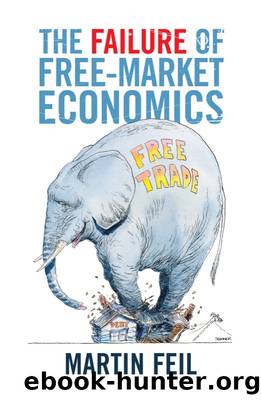The Failure of Free-Market Economics by Martin Feil

Author:Martin Feil
Language: eng
Format: epub
Tags: BUS069000, BUS029000, BUS022000
Publisher: Scribe Publications
Published: 2010-03-29T00:00:00+00:00
Chapter Eight
Fixing the Problem: domestic strategies
The reaction of government and many public-service mandarins to the global financial disaster is partially based on denial. This attitude makes some pragmatic sense, as they and all of us want to avoid setting off a panic.
Ironically, until recently most of the senior public servants in the economic departments and statutory authorities were all true believers in free-market economics. There are still some stone-warrior recidivists among them now. This school of believers want the chips to fall where they may, to let the next group of self-interested shysters start to develop the latest elixir for immortal life or perhaps university courses in alchemy. The alchemists may be the new economists. Their new economy will sit on the ruins of the old.
This may sound extreme, but readers should understand that, for the past 20 years at least, there was no place in any major government economic forum or institution for someone who believed that the government had to be involved in regulation of the economy. This wasnât an open environment where clever, experienced people could hold an alternative view.
Some people, inside and outside the technostructure, take the view that nothing serious has happened because they are not personally affected. This perspective is generally limited to childless white males, less than 35 years old, working in the services or professional sectors, or in the middle reaches of think tanks and the public service, who are receiving high incomes. They have no concept of the capital outlays on houses, children, travelling expenses, and miscellaneous costs that await them, and have not modelled those projections. Perhaps they expect to inherit the money they will need.
Alternatively, if they are receiving high levels of income, and sold shares on margin, they may have made a fortune during the downturn. They are also benefiting from historically low interest rates.
We have an imperfect knowledge of the damage caused by the global financial disaster, and we will not be told the full story.
It was instructive to watch the US congressional hearings in 2009, during which congressman Alan Grayson questioned the chairman of the US Federal Reserve, Ben Bernanke, and other senior officers (including the inspector-general) about the $553 billion that the Fed had lent to central banks all over the world. The central banks then on-lent the money in their own countries to banks, companies, and other organisations that the Fed canât or wonât reveal.
Even New Zealand got $US9 billion. What did they do with that money? How much money did Australia get from the Federal Reserve? How much has the Reserve Bank of Australia lent to domestic banks?
We have no process available to us with which to publicly question the Reserve Bank or Treasury on these matters. We have no parliamentary process to discover the truth â other than rigged royal commissions that flow from investigative processes which were anachronisms 50 years ago.
Why doesnât the government use its powers to force major enterprises and government institutions to disclose the full extent of our
Download
This site does not store any files on its server. We only index and link to content provided by other sites. Please contact the content providers to delete copyright contents if any and email us, we'll remove relevant links or contents immediately.
International Integration of the Brazilian Economy by Elias C. Grivoyannis(106925)
The Radium Girls by Kate Moore(12000)
Turbulence by E. J. Noyes(8001)
Nudge - Improving Decisions about Health, Wealth, and Happiness by Thaler Sunstein(7676)
The Black Swan by Nassim Nicholas Taleb(7086)
Rich Dad Poor Dad by Robert T. Kiyosaki(6569)
Pioneering Portfolio Management by David F. Swensen(6267)
Man-made Catastrophes and Risk Information Concealment by Dmitry Chernov & Didier Sornette(5978)
Zero to One by Peter Thiel(5760)
Secrecy World by Jake Bernstein(4724)
Millionaire: The Philanderer, Gambler, and Duelist Who Invented Modern Finance by Janet Gleeson(4441)
The Age of Surveillance Capitalism by Shoshana Zuboff(4264)
Skin in the Game by Nassim Nicholas Taleb(4223)
The Money Culture by Michael Lewis(4168)
Bullshit Jobs by David Graeber(4161)
Skin in the Game: Hidden Asymmetries in Daily Life by Nassim Nicholas Taleb(3972)
The Dhandho Investor by Mohnish Pabrai(3739)
The Wisdom of Finance by Mihir Desai(3714)
Blockchain Basics by Daniel Drescher(3564)
